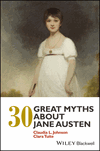JANE AUSTEN WAS ANONYMOUS
Summary
It is commonly assumed that women novelists always published anonymously during Jane Austen's time. Given prevalent standards of female respectability and modesty, fame could easily slide into infamy, and being a woman in public could slide very easily to being seen, in some sense, as a public woman. Her subsequent novels identify her as the author of her previous novels. At the outset of her career, Austen clearly went out of her way to conceal her identity, not anonymously but pseudonymously. When Austen sold Susan (later Northanger Abbey) to publisher Richard Cosby and Son in 1803 for £10, she used the pseudonym Ashton Dennis, a pen name every bit as gender-neutral as Currer Bell. Elena Ferrante, surely the best living practitioner of anonymity, has considered Austen's decision freeing rather than repressive, as an active and empowering authorial choice.



